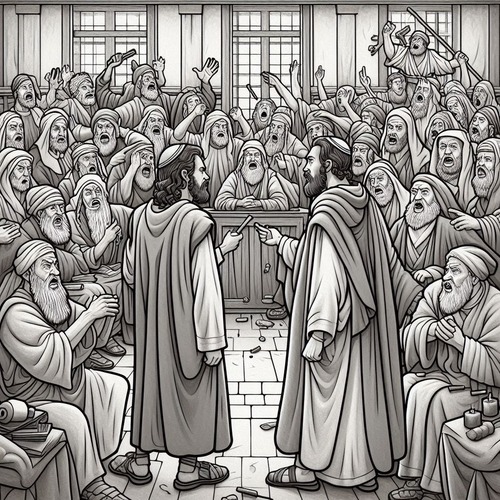Is Eternal Security a License to Sin?
A REFORMED DEFENCE OF PERSEVERANCE OF THE SAINTS
If salvation is eternally secure, why not sin freely? Doesn’t the doctrine, “once saved, always saved” open the door to moral chaos? This challenging question has echoed through Christian history, from the early church to modern evangelical circles. Critics argue eternal security inevitably leads to antinomianism—the belief that grace renders moral law irrelevant.
But this objection fundamentally misunderstands what Reformed theology teaches about perseverance of the saints. In Reformed tradition, eternal security doesn’t mean God preserves nominal believers or those who merely recite a prayer. Rather, it’s God’s sovereign preservation of true believers to the end—those genuinely regenerated by His Spirit. This doctrine flows naturally from TULIP: our total depravity requires God’s unconditional election, accomplished through Christ’s particular atonement, applied by irresistible grace, and sealed by His persevering power.
See how far from promoting sin, the doctrine fosters holy living, as true faith transforms the heart…
THE NATURE OF TRUE SAVING FAITH
The license-to-sin objection assumes faith is mere intellectual assent—a one-time decision disconnected from ongoing transformation. But James demolishes this view: “Faith without works is dead” (James 2:26). True saving faith is transformative faith.
Paul reinforces this in Ephesians 2:8-10. Yes, we’re saved by grace through faith, not works. But notice verse 10: “We are his workmanship, created in Christ Jesus for good works, which God prepared beforehand, that we should walk in them.” Good works aren’t the root of salvation—they’re the inevitable fruit.
Jesus Himself established this principle: “By their fruits you will know them” (Matthew 7:16). Genuine believers produce spiritual fruit not because they have to, but because they’ve been fundamentally changed. This addresses the historic antinomian error that separated justification from sanctification. Reformed theology insists: saving faith always works through love (Galatians 5:6).
THE REGENERATING POWER OF THE HOLY SPIRIT
Eternal security isn’t maintained by human willpower but by the Spirit’s regenerating work. Ezekiel prophesied this transformation: “I will give you a new heart, and a new spirit I will put within you… And I will put my Spirit within you, and cause you to walk in my statutes” (Ezekiel 36:26-27).
Notice the language: God causes believers to walk in His ways. This isn’t external conformity but internal transformation. When the Spirit regenerates, He doesn’t just change our standing before God—He changes our wanting. The regenerate heart desires to please God, not exploit His grace.
Paul explains this well: “If anyone is in Christ, he is a new creation. The old has passed away; behold, the new has come” (2 Corinthians 5:17). A genuinely converted person has new desires, new affections, new spiritual appetites. They don’t want to continue in sin—they want to honour the God who saved them.
UNION WITH CHRIST: THE FOUNDATION OF PERSEVERANCE
Romans 6 delivers the decisive blow to the license objection. Paul anticipates the exact question: “What shall we say then? Are we to continue in sin that grace may abound?” His response isn’t a mild “we shouldn’t”—it’s an emphatic “By no means!” (Romans 6:1-2).
Why is continuing in sin impossible for the truly regenerated? Because we’ve died to sin and been raised with Christ. “How can we who died to sin still live in it?” Paul asks. Union with Christ means we share His death to sin and His resurrection to righteousness.
This isn’t merely positional but experiential. Galatians 2:20 explains: “I have been crucified with Christ. It is no longer I who live, but Christ who lives in me.” The believer’s fundamental identity has shifted. They’re no longer slaves to sin but servants of righteousness (Romans 6:18).
THE ROLE OF ASSURANCE IN CHRISTIAN LIVING
Proper assurance actually motivates holiness rather than hindering it. John writes, “I write these things to you who believe in the name of the Son of God, that you may know that you have eternal life” (1 John 5:13). But notice: this same epistle provides tests for genuine faith—love for the brethren, obedience to God’s commands, and victory over the world.
True assurance examines the fruit of faith. The Westminster Confession notes assurance “is not of the essence of faith” but grows from “the evidence of those graces unto which these promises are made.” In other words, genuine security in Christ energises obedience because it flows from transformed hearts that want to please their Saviour.
ADDRESSING THE WARNING PASSAGES
What about passages like Hebrews 6:4-6 or 10:26-31 that seem to threaten loss of salvation? Reformed hermeneutics applies the clear to interpret the unclear. These warnings address the covenant community collectively, not individual believers absolutely. They serve to keep genuine believers persevering—much like guardrails keep cars on the road not by being struck, but by their presence.
As Calvin noted, “We dream not of a faith which is devoid of good works, nor of a justification which can exist without them.” The warning passages actually support perseverance by describing the means God uses to preserve His people.
CONCLUSION: GRACE THAT CONSTRAINS AND COMPELS
The ultimate answer to the license objection is this: those most secure in grace are most motivated to holiness. Paul exemplified this: “By the grace of God I am what I am, and his grace toward me was not in vain. On the contrary, I worked harder than any of them, though it was not I, but the grace of God that is with me” (1 Corinthians 15:10).
True eternal security transforms rather than licenses. It produces believers who, secure in God’s love, joyfully pursue holiness not from fear of losing salvation, but from gratitude for salvation already secured. The doctrine of perseverance doesn’t open the door to sin—it slams it shut through the transforming power of grace.
The question isn’t whether eternal security permits sin, but whether our security flows from genuine faith that inevitably works through love. As Paul challenged the Corinthians: “Examine yourselves, to see whether you are in the faith” (2 Corinthians 13:5). True faith transforms. Transformed hearts persevere. And God preserves what He has truly begun.
IS ETERNAL SECURITY A LICENCE TO SIN? RELATED FAQs
Doesn’t this doctrine still allow for presumption? Can’t someone claim security while living in deliberate sin? True Reformed assurance requires self-examination, not presumption. The Westminster Confession distinguishes between the “essence of faith” and assurance itself—genuine believers can doubt their salvation, while false professors often display false confidence. Biblical assurance examines three evidences: the promises of Scripture, the inward evidence of grace, and the witness of the Spirit (Romans 8:16). Someone living in deliberate, unrepentant sin lacks the second evidence entirely. As John Calvin warned, “It is faith alone that justifies, but faith that justifies is never alone”—true faith produces fruit that validates assurance.
- What about moral failures of believers? Don’t we see Christians fall into serious sin? Genuine believers can and do fall into grievous sin—David’s adultery and murder being the prime biblical example. However, there’s a crucial distinction between the believer’s falling into sin and living in sin as their settled pattern. True believers experience what the Puritans called “the expulsive power of a new affection”—while they may stumble, they cannot remain comfortable in sin indefinitely. The Holy Spirit brings conviction, discipline, and restoration (Hebrews 12:6-11). Persistent, unrepentant sin with no spiritual distress indicates a heart that may never have been regenerated. The difference isn’t sinlessness, but the presence of spiritual conflict and ultimate victory.
- Haven’t there been historical examples of antinomianism proving this doctrine dangerous? Yes, antinomian movements have periodically emerged, but they consistently misrepresent Reformed teaching. The 17th-century Antinomian Controversy in New England saw figures like Anne Hutchinson claim sanctification was unnecessary evidence of justification. However, Reformed leaders like John Cotton and later Jonathan Edwards firmly rejected this, insisting justification and sanctification are distinct but inseparable. Modern “easy believism” similarly distorts perseverance by divorcing it from regeneration. True Reformed theology has consistently maintained God preserves believers in holiness, not despite the absence of holiness. Historical antinomians typically held to immediate, direct revelation and rejected the means of grace—positions orthodox Reformed theology has always opposed.
How does eternal security differ from “once saved, always saved” teaching? While both affirm that true believers cannot lose salvation, Reformed theology is far more nuanced about who constitutes a “true believer.” Popular “once saved, always saved” often focuses on a single decision or prayer, suggesting anyone who “prayed the sinner’s prayer” is eternally secure regardless of subsequent life pattern. Reformed perseverance, however, emphasises that God preserves those whom He has genuinely regenerated—and regeneration always produces transformation. We don’t look to a past decision for assurance, but to present evidences of grace. As the Canons of Dort state, “It is not the actual falling that distinguishes the elect from the reprobate, but the not continuing in the fall, and their being restored through repentance to a godly course.”
- If God preserves believers, what role does human effort play in perseverance? Reformed theology affirms both divine sovereignty and human responsibility without contradiction. God preserves believers through their perseverance, not despite their lack of it. Scripture commands us to “work out your salvation with fear and trembling” while immediately explaining “for it is God who works in you both to will and to work for his good pleasure” (Philippians 2:12-13). The believer strives, prays, fights sin, and uses the means of grace—but does so as the result of God’s preserving work, not as the condition for it. As JI Packer explained, we are “responsible agents” but not “ultimate originators.” The perseverance is real human activity that is ultimately divine in its source and certainty.
- What about believers who seem to “lose their faith” later in life or die in what seems to be apostasy? These difficult cases require pastoral wisdom and theological precision. Reformed theology distinguishes between temporary faith and saving faith (Matthew 13:20-21). Some people exhibit what appears to be genuine conversion—they may even demonstrate spiritual gifts (Hebrews 6:4-6)—but later fall away permanently. Rather than proving believers can lose salvation, these cases demonstrate that not all who appear to believe possess regenerating faith. As John wrote, “They went out from us, but they were not of us; for if they had been of us, they would have continued with us” (1 John 2:19). True believers may experience severe doubts, periods of backsliding, or even what feels like loss of faith, but they cannot finally and totally apostatise because their faith rests on God’s unchanging election, not their own stability.
How should pastors counsel those struggling with assurance while maintaining this doctrine? Pastoral care requires distinguishing between different types of assurance struggles. For the genuinely converted but struggling believer, point them to Christ’s finished work while encouraging examination of the fruits of faith—love for God’s people, grief over sin, delight in Scripture, growth in holiness (however imperfect). For the presumptuous, emphasise that saving faith produces transformation—the absence of any spiritual fruit should cause deep concern. For the despairing, remind them that assurance can fluctuate while salvation remains secure; weak faith is still true faith. The goal isn’t to create false peace or false anxiety, but to direct souls to Christ. As Richard Baxter wisely noted, “It is not the strength of your faith but the truth of your faith that saves you.” Counsel should always drive people toward Christ, not toward introspective despair or careless presumption.
IS ETERNAL SECURITY A LICENCE TO SIN? OUR RELATED POSTS
Editor's Pick

Paul’s Mandate for Men: Headship Or Servant Leadership? Or Both?
Modern Christianity has fallen into a trap. We've created an either/or battle between "headship" and "servant leadership," as if these [...]

Should We Stop Using Male Pronouns for God? Why Do We Say No?
A friend of ours arrived eagerly at his first theology class in seminary. But he quickly discovered something troubling: the [...]

Did Old Testament Law Force Women to Marry their Rapists?
**Editor’s Note: This post is part of our series, ‘Satan’s Lies: Common Deceptions in the Church Today’… Viral misinformation abounds [...]

From Danvers To Nashville: Two Statements, One Biblical Vision
30 years separate the Danvers Statement on Biblical Manhood and Womanhood (1987) and the Nashville Statement on Human Sexuality (2017). [...]

The Nashville Statement: Why Affirm It Despite Media Backlash?
WHY DO REFORMED CHRISTIANS STAND BY THIS STATEMENT ON MARRIAGE AND GENDER? When the Nashville Statement was released in 2017, [...]

Who Is Belial? Solving The 2 Corinthians 6:15 Mystery
Belial: This name from the pages of Scripture chills the soul. Who is this mysterious figure Paul invokes in 2 [...]

Celibacy Or Castration: What Jesus Really Means in Matthew 19:12
One of Scripture's most shocking misinterpretations led theologian Origen to castrate himself in the third century. His tragic mistake? Taking [...]

Philippians 4:13: Did Paul Really Mean We Can Do ALL Things?
"I can do all things through Christ who strengthens me." It's on gym walls, graduation cards, and motivational posters everywhere. [...]

The Ordinary Means of Grace: Why Are They Indispensable?
ORDINARY MEANS FOR EXTRAORDINARY TRANSFORMATION What if God's most powerful work in believers' lives happens through the most ordinary activities? [...]

Is the Bible God’s Word? Or Does It Only Contain God’s Word?
The authority of Scripture stands at the crossroads of modern Christianity. While some argue the Bible merely contains God’s Word [...]
SUPPORT US:
Feel the Holy Spirit's gentle nudge to partner with us?
Donate Online:
Account Name: TRUTHS TO DIE FOR FOUNDATION
Account Number: 10243565459
Bank IFSC: IDFB0043391
Bank Name: IDFC FIRST BANK






